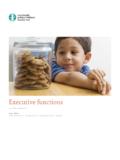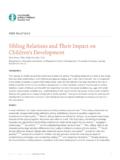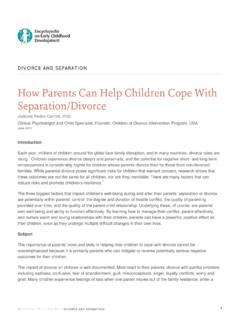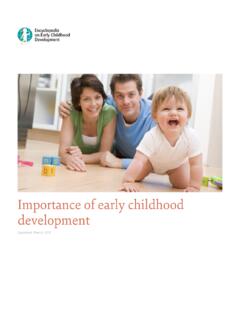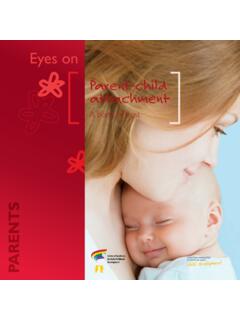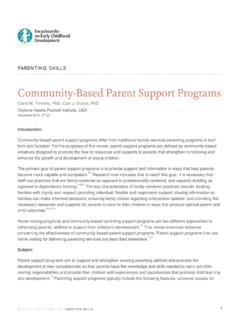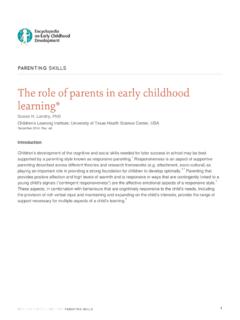Transcription of The Development of Theory of Mind in Early …
1 SOCIAL COGNITIONThe Development of Theory of mind in Early Childhood*1 Janet Wilde Astington, PhD, 2 Margaret J. Edward, MA1 Institute of Child Study, University of Toronto, Canada2 School District 10, New Brunswick Education, CanadaAugust 2010 IntroductionThe most important Development in Early childhood social cognition is the Development of Theory of ,2 Its Development during the first five years of life is described in this article, as well as factors that influence its Development , and the consequences of its Development for children s lives at home and cognition is at the heart of children s ability to get along with other people and to see things from their point of view.
2 The basis of this crucial ability lies in the Development of Theory of ,4 Theory of mind refers to our understanding of people as mental beings, each with his or her own mental states such as thoughts, wants, motives and feelings. We use Theory of mind to explain our own behaviour to others, by telling them what we think and want, and we interpret other people s talk and behaviour by considering their thoughts and 2010-2017 CEECD / SKC-ECD | SOCIAL COGNITION11111 The Development of Theory of mind from birth to 5 years of age is now well described in the research literature4,5 or at least, we can describe how infants and children behave in experimental situations as well as in natural settings.
3 There are problems, however, in interpretation of the findings. Some researchers claim that even babies are aware of other people s thoughts and wants while others think that this understanding does not develop until the toddler or preschool years. This contradiction can be resolved by taking a developmental view of Theory of mind that is, Early -developing intuitive awareness later becomes more reflective and , children s developing language abilities play an important role in this ContextChildren s awareness of thoughts, wants and feelings is inferred from what they say and do in naturalistic and experimental situations.
4 Natural settings show the child s abilities to interact with others in the real settings, where children are questioned individually about hypothetical scenarios, reveal the precise level of a child s independent Key Research QuestionsRecent Research ResultsResearch shows that infants display behaviours that are important beginnings for Theory -of- mind Development (see details in Moore s and Sommerville s papers in the chapter on social cognition9,10).By age 2, children clearly show awareness of the difference between thoughts in the mind and things in the world. In pretend play ( , pretending a block is a car), toddlers show that they can distinguish between an object the block and thoughts about the object the block as a They also understand that people will feel happy if they get what they want and will feel sad if they do And at this age children see that there may be a difference between what they want and what another person This developing awareness is seen in children s language too: 2-year-olds talk about what they and others want and like and feel.
5 When they are 3, they also talk about what people think and are the typical developments in Theory of mind from infancy to age 5? factors, both those in the social environment and those internal to the child, influence the rate of Development ? are the consequences of Theory -of- mind Development for children s social competence and for their success in school? 2010-2017 CEECD / SKC-ECD | SOCIAL COGNITION22222A crucial Development occurs around 4 years of age when children realize that thoughts in the mind may not be true. For example, children are allowed to discover that a familiar candy box actually contains pencils, and then are asked what their friend will think is in the box, before looking inside Three-year-olds assume that the friend will know it has pencils inside, just as they now do, but 4-year-olds recognize that the friend will be tricked, just as they were.
6 Three-year-olds also do not remember that their own belief has If the pencils are put back in the box and they are asked what they thought was inside before opening it, they ll say pencils not candy but 4-year-olds remember they thought it was candy. That is, 3-year-olds are not simply egocentric, , thinking everyone knows what they know, rather, they come to understand their own minds and those of other people at the same time. By the age of 4 or 5 years, children realize that people talk and act on the basis of the way they think the world is, even when their thoughts do not reflect the real situation, and so they will not be surprised if their uninformed friend looks for candy in the box they know has pencils factors in the social environment influence the rate of typical Development of Theory of mind .
7 For example, children show earlier awareness of mental states if their mothers talk about thoughts, wants and feelings,17and provide reasons when correcting Children with brothers and/or sisters are aware of mental states sooner than only The rate of Development is also influenced by children s participation in pretend play,20 their experiences of story-book reading21 and of talking with others about past internal to the child that influence the rate of Development include language abilities,23 and cognitive abilities that control and regulate behaviour (known as executive functions).
8 24 Research shows that Theory -of- mind Development has consequences for children s social functioning and school success. Children with more developed Theory of mind are better communicators and can resolve conflicts with their friends;25 their pretend play is more complex;26 their teachers rate them as more socially competent;27 they are happier in school and more popular with peers;27 and their school work is more advanced in some However, a well-developed Theory of mind can also be used in antisocial ways, such as in teasing, bullying and GapsWe need to know more about how and why different environmental-social and child-cognitive factors affect the rate of Theory -of- mind Development , particularly regarding effective interventions for children whose Theory of mind is less date, the majority of studies involve middle-class, Western children.
9 More research is needed with children from different backgrounds and cultures to investigate similarities and differences in Theory -of- mind people act is governed not just by their thoughts and wants, but also by moral and social rules. Research is needed into how rule-based reasoning and Theory of mind operate together in social research is also needed into the brain processes underlying Theory of of mind develops gradually, with intuitive social skills appearing in infancy and then reflective social cognition developing during the toddler and preschool years. 2010-2017 CEECD / SKC-ECD | SOCIAL COGNITION33333 Three-year-olds know that different people may want, like and feel different things.
10 By age 4 or 5, children know that people may think different things. They understand that sometimes a person may believe something that is not true but, in that case, what the person does or says is based on the false are differences in the rate of typical Development that partly depend on factors in the environment, such as family talk and disciplinary strategies, interaction with siblings, story books and pretend play, as well as factors in the child, such as language and cognitive control are consequences to Theory -of- mind Development that are seen in children s social competence and success in for Parents.

